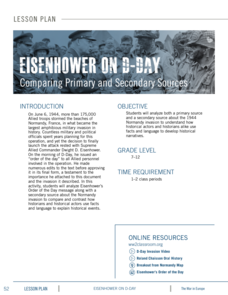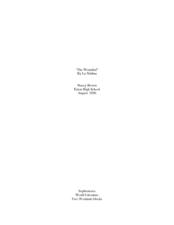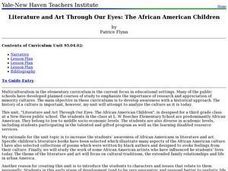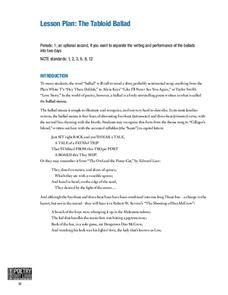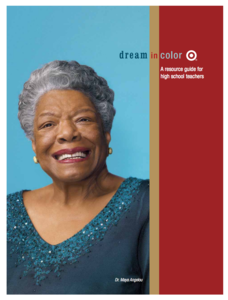National History Day
More Than Mud and Cooties: The Poetry of World War I Soldiers
Poetry is not just for romance. Teach middle schoolers about soldiers' experiences during World War I with poetry written by the soldiers themselves. The instructional activity includes a simulation activity, a graphic organizer...
Red River Press
Remembrance Day, Lest We Forget
Have we forgotten? As part of their study of Remembrance Day, class members consider whether countries have kept their promise not to forget and create their own remembrance ceremony.
Core Knowledge Foundation
Unit 4: Listen, My Children - Poems for Fourth Graders
Over three weeks, fourth graders explore the world of poetry. They listen to authors such as Shel Silverstein and Maya Angelou, complete word work activities, and practice spelling skills. Budding poets take pen to paper with daily...
National WWII Museum
Eisenhower on D-Day: Comparing Primary and Secondary Sources
Dwight D. Eisenhower's message to troops for D-Day is iconic. Individuals examine Eisenhower's words and compare that to historians' understanding of the epic events of that day using primary sources, an essay, and a Venn diagram to...
Carolina K-12
The End of World War II: Pearl Harbor, Japanese Internment Camps, and the Atomic Bomb
The end of World War II saw major events that would forever change the global landscape and international relations. Using a fantastic PowerPoint presentation and several primary source documents, your learners will discuss the bombing...
Curated OER
World Literature: “The Wounded” By Lu Xinhua
“The Wounded,” the title story from a collection of stories about the Chinese Cultural Revolution (1977-78), is the central text in a World Literature unit examining choices. An anticipation guide, discussion topics, vocabulary list,...
Royal Canadian Legion
Teachers' Guide: Take Time to Remember
The Royal Canadian Legion offers this teacher's guide designed to remind learners of all ages of the sacrifices made by Canadian soldiers in not only World War I but also the Korean and Gulf wars. The 42-page packet is filled with...
Curated OER
From Light to Dark and Back
Experiment with light and dark in a series of interactive activities that lead up to reading and writing poetry. Class members have the opportunity to observe their feelings while sitting in the light and dark and to play with shadow...
Curated OER
Literature and Art Through Our Eyes: African-American Artists
Examine the contributions of African-Americans in the worlds of art and literature. Over the course of a few days, young scholars will read and analyze a poem, a short story, and a piece of art. They complete a range of...
Maryland Department of Education
The Concept of Diversity in World Literature Lesson 12: Author's Purpose - Yeats and Achebe
Is there such a thing as fate/luck? Can one fight destiny? As part of their study of Chinua Achebe's purpose in writing Things Fall Apart, class members answer these questions from Achebe's point of view and then from William Butler...
Maryland Department of Education
The Concept of Diversity in World Literature Lesson 9: Debating Imperialism
To gain an understanding of Imperialism, class members read Rudyard Kipling's poem, "The White Man's Burden" and Mark Twain's essay, "To the Person Sitting in Darkness." Groups compare these perceptions of non-white cultures with the...
Seussville
What Can Your Class Do?
Inspire scholars to do their part for planet Earth with a read-aloud of Dr. Seuss's The Lorax, and variety of activities designed to boost the environmental activist in us all. Activities include writing poems about the Earth, sorting...
Poetry Out Loud
The Tabloid Ballad
What do the theme song from Gilligan's Island, the nursery rhyme "The Owl and the Pussy-Cat," and the poem "The Shooting of Dan McGrew" all have in common? Why, they're ballads of course! Challenge your young balladeers to compose their...
Houghton Mifflin Harcourt
Surprise!: English Language Development Lessons (Theme 2)
Surprise! is the theme of this series of ESL lessons. Cover an array of topics such as where we live, different times of day, shapes, the city and the country, what we do for fun, jobs, and games, all while practicing how to express...
TRAIN Educational & Community Services
Multicultural Activities
From catching stars developed by African pygmy tribes to chop stix pick-up or the Hanukkah dreidel, use this list of diverse multicultural activities to help your learners draw connections to unique cultures of the world.
Poetry Foundation
Dream in Color - High School
Whether focusing on African American poets, Black History Month, or the poetic experience, an amazing toolkit that encourages learners to develop unique poetic voices deserves a place in your curriculum.
Facing History and Ourselves
Dual Identities
Many of us have multiple identities. There's who we are at home, school, friends, and strangers. And often these identities come with different names. The third activity in the First Days of School series examines how names reflect...
Houghton Mifflin Harcourt
Nature Walk: English Language Development Lessons (Theme 2)
Walking in nature is the theme of a unit designed to support English language development lessons. Scholars look, write, speak, and move to explore topics such as camping, woodland animals, instruments, bodies of water, things found at a...
Gwinnett County Public Schools
Analysis of the Tuck Everlasting and The Birchbark House Text Exemplars
Looking to introduce some text-based questions into your ELA lessons? Practice the kinds of skills the Common Core demands with the seven text-based questions and the essay prompt provided here. Designed to be a three-day lesson, day one...
Reed Novel Studies
We All Fall Down: Novel Study
Where were you when the world stopped turning that September day? Will, a ninth grade student in We All Fall Down, was at work with his father in the World Trade Center. Scholars read Will's story of the accounts told in first person....
Curated OER
Pre-AP Strategies for Spanish Literature
Take a break from vocabulary development and have your Spanish scholars immerse themselves in Spanish culture. What are common Spanish proverbs? In short sessions over the course of a few weeks, the class will learn about different...
Council for the Curriculum, Examinations and Assessment
Victorian Historians
Take the class back in time to the Victorian Era! The resource provides a plethora of activities that create experiences for scholars in class. Some activities include a fun fair, viewing the starry-night painting, and even experiencing...
Maryland Department of Education
The Concept of Identity Lesson 2: The Historical/Biographical Approach
"How does our environment shape our identity?" After researching biographical information about John Knowles and considering how these experiences are reflected in A Separate Peace, class members consider the strengths and weaknesses of...
Maryland Department of Education
The Concept of Identity Lesson 4: The Psychological Approach
Readers apply Sigmund Freud's theories of the unconscious mind and the psychological approach to literary criticism to analyze and evaluate the relationship between two characters in A Separate Peace.





